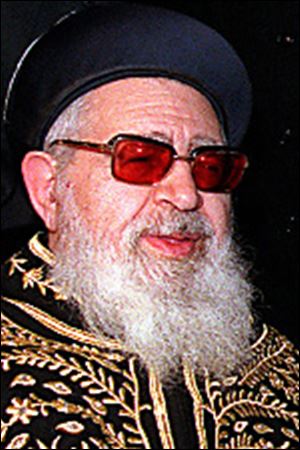
OBITUARY
Rabbi was potent in politics
10/7/2013
Yosef
JERUSALEM — Rabbi Ovadia Yosef, who as the spiritual leader of the ultra-Orthodox Shas Party became a forceful figure in Israeli politics fighting for the interests of Jews of Middle Eastern and North African origin, died Monday. He was 93.
His death was announced by Avigdor Kaplan, the director of the Hadassah Medical Center in Ein Kerem in Jerusalem, where the rabbi had been treated. It set off a huge outpouring of grief and one of the biggest events the city has seen.
By police estimates, 700,000 people — almost one-tenth of the population of Israel — swept into the streets and onto rooftops along the route of the funeral procession, many of them chanting prayers and tearing their clothes in a show of grief that brought much of the city to a standstill.
The van carrying Rabbi Yosef’s body took more than four hours to inch through the throng, mostly men and boys in black Orthodox dress, on its short journey from the Porat Yosef yeshiva in the Geula neighborhood to Sanhedria Cemetery, where the rabbi was buried shortly before 11 p.m.
Rabbi Yosef embodied a particular blend of religion, tradition, populism, and ethnicity. As the leader of a Sephardic council of Torah sages that founded Shas in the early 1980s, he harnessed the underdog sentiment of many non-European Israeli Jews, worked to restore their pride, and turned them into a potent political force.
Shas became a major player in governing coalitions under Rabbi Yosef’s leadership, and Israeli leaders of all stripes made pilgrimages to his home in Jerusalem seeking his support. As a Sephardic Torah scholar and arbiter of Halakha, or Jewish law, Rabbi Yosef was often described by his followers as “the greatest of the generation.” He wrote Talmudic commentaries and volumes of answers, known as responsa, to questions on religious law. In 1970 he was awarded the prestigious Israel Prize for rabbinical literature.
“The Jewish people have lost one of the wisest men of this generation,” Israeli Prime Minister Benjamin Netanyahu said. “Rabbi Ovadia was a giant in Torah and Jewish law and a teacher for tens of thousands.”
President Shimon Peres of Israel said he was at the rabbi’s bedside hours before his death. “When I pressed his hand, I felt I was touching history,” he said, “and when I kissed his head, it was as though I kissed the very greatness of Israel.”
Yossi Elituv, co-author of a book about the life and works of Rabbi Yosef, said that the rabbi’s greatness in interpreting religious law was based on his chronicling of rulings of the last 200 years and the boldness with which he issued his own, often lenient rulings, sometimes on delicate issues that other rabbis dared not approach.